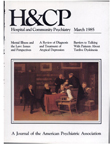Atypical Depression: A Review of Diagnosis and Treatment
Abstract
The diagnosis of atypical depression has been used in a variety of ways in the psychiatric literature. The authors review the different uses of the term and then examine the syndrome's capacity to reliably predict course of illness, family prevalence, biological test data, and response to treatment. They conclude that as a diagnosis, atypical depression is misleading and does not describe a discrete or homogeneous group of patients. However, the literature on atypical depression has been extremely important in identifying patients for whom pharmacological intervention may be of great benefit and for whom it has been underutilized in the past.
Access content
To read the fulltext, please use one of the options below to sign in or purchase access.- Personal login
- Institutional Login
- Sign in via OpenAthens
- Register for access
-
Please login/register if you wish to pair your device and check access availability.
Not a subscriber?
PsychiatryOnline subscription options offer access to the DSM-5 library, books, journals, CME, and patient resources. This all-in-one virtual library provides psychiatrists and mental health professionals with key resources for diagnosis, treatment, research, and professional development.
Need more help? PsychiatryOnline Customer Service may be reached by emailing [email protected] or by calling 800-368-5777 (in the U.S.) or 703-907-7322 (outside the U.S.).



